We’ve been carrying the YOLOLIV yolobox Mini in our kit for the last few weeks, and it feels a little like bringing a broadcast truck in the palm of your hand. On paper it promises a lot - an encoder, monitor, switcher, and recorder all rolled into one compact unit – and in practice it’s focused on one clear goal: make multi-camera, multi-platform live streaming genuinely portable and straightforward.
What caught our attention promptly was how complete the package is. The 5.5″ touchscreen makes live switching and on-screen graphics feel tactile and immediate, and the ability to push a single feed to Facebook, YouTube, Twitch, or any custom RTMP/SRT destination together opens up real flexibility for creators who want to meet audiences wherever they are. We also appreciated the built-in toolkit – overlays, instant replay, and video cropping – which let us polish a stream without lugging extra hardware or a laptop.
We put the Mini through its paces in different environments, relying on Wi‑Fi, Ethernet, and the integrated 4G LTE option to see how resilient it would be on the move. Its battery-powered, palm-sized form factor – rated for up to three hours of streaming – made it ideal for fast mobile shoots, small events, and solo productions where simplicity matters more then a full studio setup.
In the full review that follows, we’ll walk through setup, day-to-day usability, streaming stability across different networks, image and audio handling, and who the yolobox Mini will suit best – along wiht the quirks we noticed along the way. if you’re curious whether this pocket live studio can replace a larger rig or simply make streaming less painful, keep reading.
Our Overview and Hands On First Impressions of the YoloBox Mini
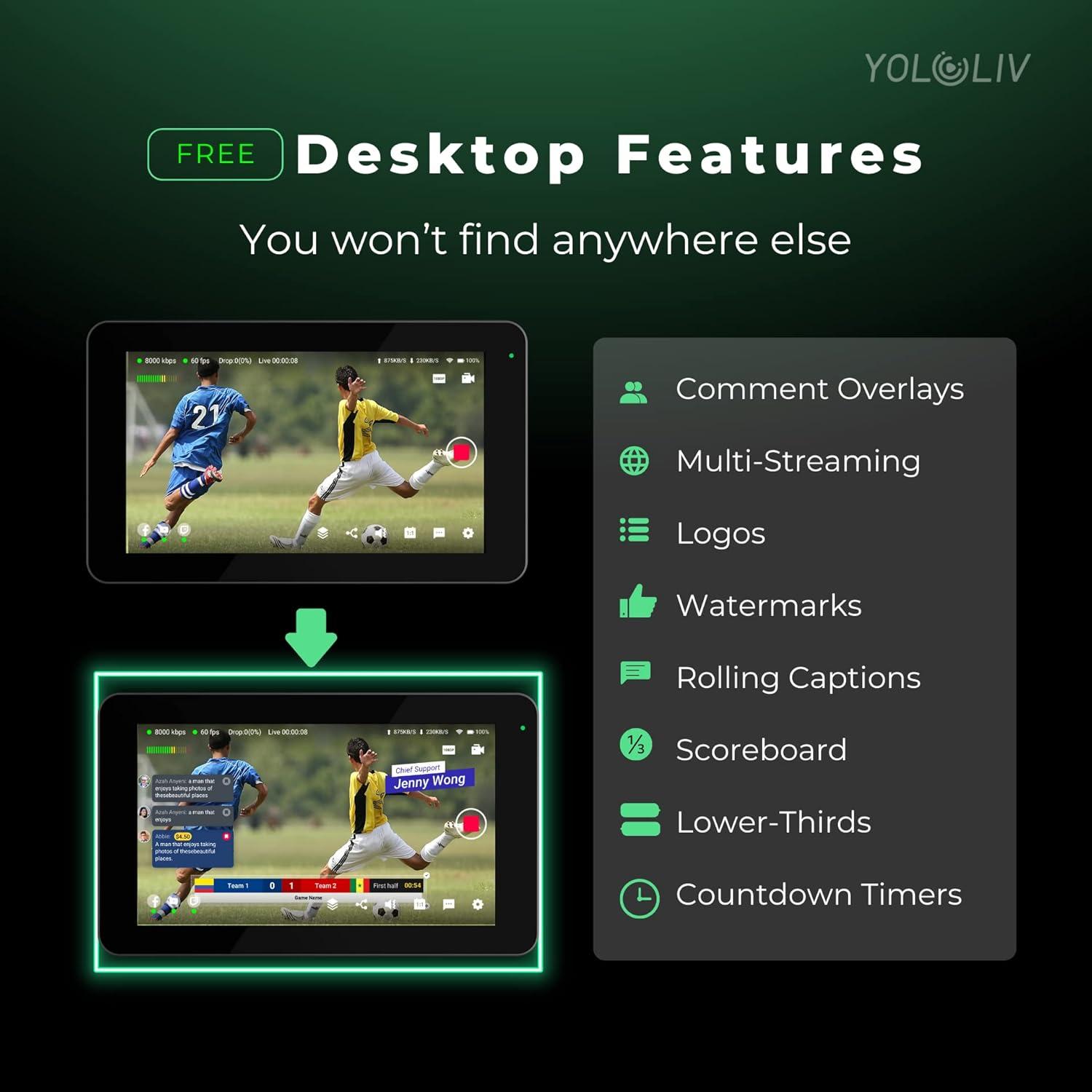
First impressions – we were struck by how much functionality is packed into something that fits in our palm. The integrated encoder, monitor, switcher and recorder feel coherent on the 5.5″ touchscreen: live switching, adding overlays and monitoring audio all work with surprising fluidity, even when we handed controls to a newcomer.On the road the built‑in battery delivered close to the advertised three hours during mixed-record/stream sessions, and the instant replay and video‑cropping tools made quick edits feel professional without a laptop. Key highlights include:
- Multi-platform streaming - simultaneous output to Facebook, YouTube, Twitch and custom RTMP/SRT targets.
- Flexible connectivity – 4G LTE, WiFi and Ethernet keep us streaming where network options vary.
- Portable studio – all-in-one design saves setup time for solo creators and small crews.
In hands‑on use we appreciated how the device turns complicated workflows into a simple flow. Audio and video monitoring are clear on the touchscreen,switching is immediate,and the built‑in overlays and replay elevates our live shows without extra gear.We tested multiple inputs and simultaneous destinations, and the basic controls covered most on‑the‑fly needs. For easy reference, a short spec snapshot we kept on our desk:
| Spec | Quick Note |
|---|---|
| Screen | 5.5″ touchscreen |
| Battery | Up to ~3 hours |
| Connectivity | 4G LTE, WiFi, Ethernet |
| Streaming | Multi-platform + RTMP/SRT |
Why We Appreciate the Compact Build Touchscreen Controls and Multi Camera Streaming Capabilities
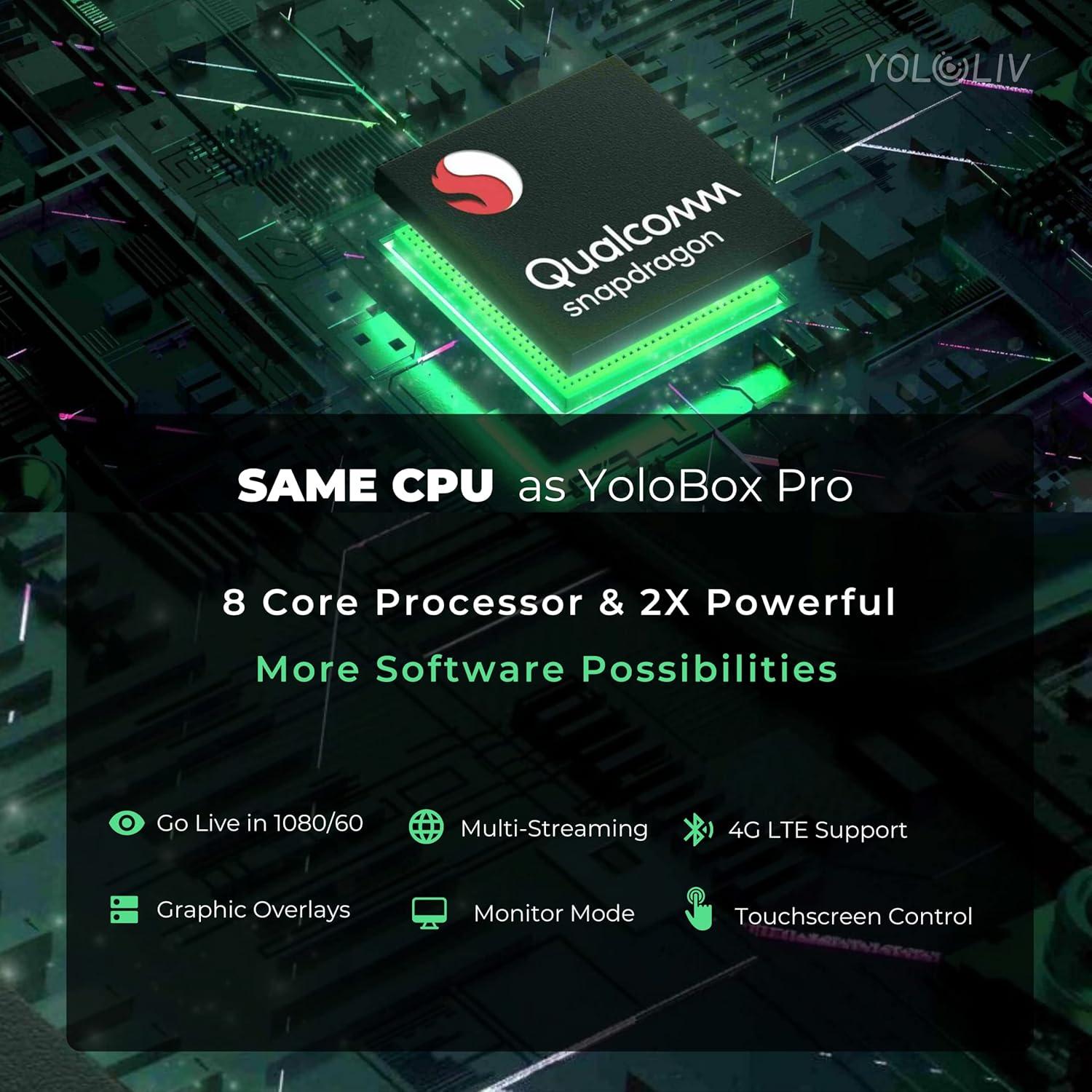
We love how the compact build turns a full live-production rig into something that fits in our palm without sacrificing core functionality. By combining encoder, monitor, switcher, and recorder into a single unit, the device lets us set up fast and move freely-ideal for pop-up broadcasts, outdoor shoots, and one-person crews. The 5.5″ intuitive touchscreen makes live switching, adding graphics, and monitoring audio feel effortless; even team members with little technical background can run a polished stream. Key practical perks for our workflow include:
- Portable power: Built-in battery for up to 3 hours of streaming on the go.
- Onboard tools: Overlays, instant replay, and video cropping to elevate production value without extra hardware.
- beginner-amiable control: Touch-driven interface that speeds scene changes and lowers the learning curve.
| Feature | At-a-glance |
|---|---|
| Screen | 5.5″ touchscreen |
| Battery | Up to 3 hours |
| Connectivity | 4G LTE / WiFi / Ethernet |
| Platforms | Facebook,YouTube,Twitch,RTMP/SRT |
What seals the deal for us is the seamless multi-camera and multi-platform streaming capability: we can feed multiple cameras,switch live between angles,and broadcast simultaneously to Facebook,YouTube,Twitch or any custom RTMP/SRT destination so our audience sees the best view no matter where they tune in. The flexible connectivity options-4G LTE,WiFi,and Ethernet-give us confidence to stream reliably from crowded venues or remote locations,and the built-in production features mean fewer devices to pack and manage. Ready to simplify your live workflow? Shop it on Amazon
Practical Insights from Our Tests and Recommended Settings for Reliable Live Production
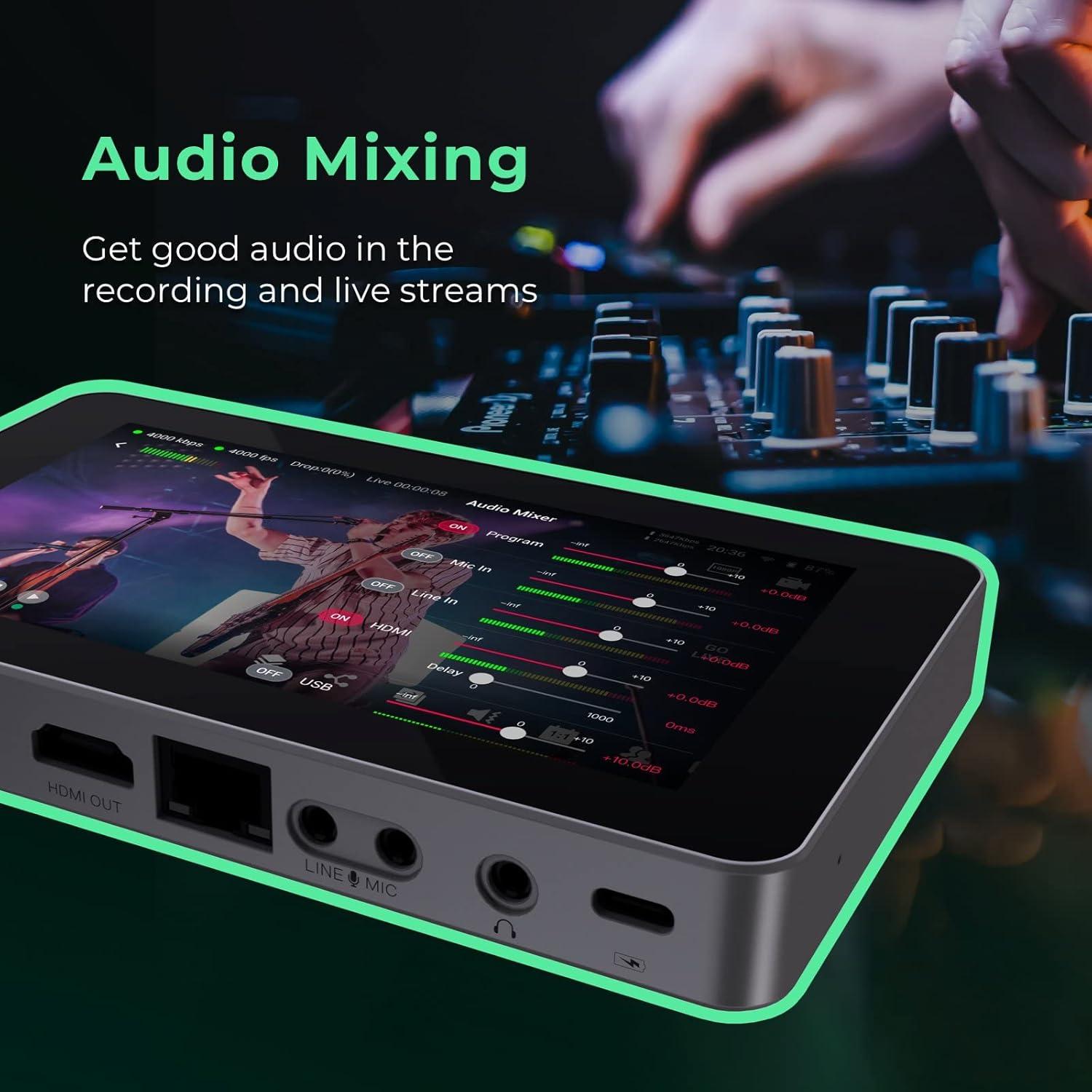
What we learned in the field: In live events and mobile shoots the 5.5″ touchscreen proved indispensable for fast switching and on-the-fly graphics – we rarely needed a laptop once the show started.The built-in overlays, instant replay and cropping sharpened the production value, and the palm-sized form factor with an internal battery gave us true freedom to move between locations for up to about three hours of continuous streaming.Key practical takeaways we rely on before every show include:
- Pre-set streaming destinations: add Facebook,YouTube and any custom RTMP/SRT endpoints well before go-live to avoid last-minute delays.
- Network redundancy: have Ethernet ready for fixed venues and 4G LTE as a backup when WiFi is flaky.
- Audio checks: use the touchscreen meters to trim levels and mute noisy sources before you cut to live.
- Battery strategy: swap or top-up power for runs longer than three hours; carry a small power bank or spare battery pack.
Our recommended settings for reliable live production: For most events we stream at 720p or 1080p depending on upstream bandwidth and audience expectations; choose lower resolution for limited cellular connections and 1080p for wired/Ethernet setups.below is a quick reference we use in the field - it balances quality with stability and takes advantage of the device’s multi-platform streaming so we can reach Facebook, YouTube and Twitch at once without extra encoders.
| Use Case | Resolution | Bitrate (kbps) | Network |
|---|---|---|---|
| Studio / Wired Venue | 1080p | 4500-6000 | ethernet |
| Mobile / On-the-go | 720p | 2500-4000 | 4G LTE / WiFi |
| Low-bandwidth / Backup | 480p | 800-1500 | Cellular (bonded) |
Quick checklist: use CBR for consistent delivery, confirm multi-platform targets before going live, monitor audio meters during streaming, and keep an Ethernet or 4G fallback ready. ready to streamline your next live production? Grab it on Amazon
Pros & Cons
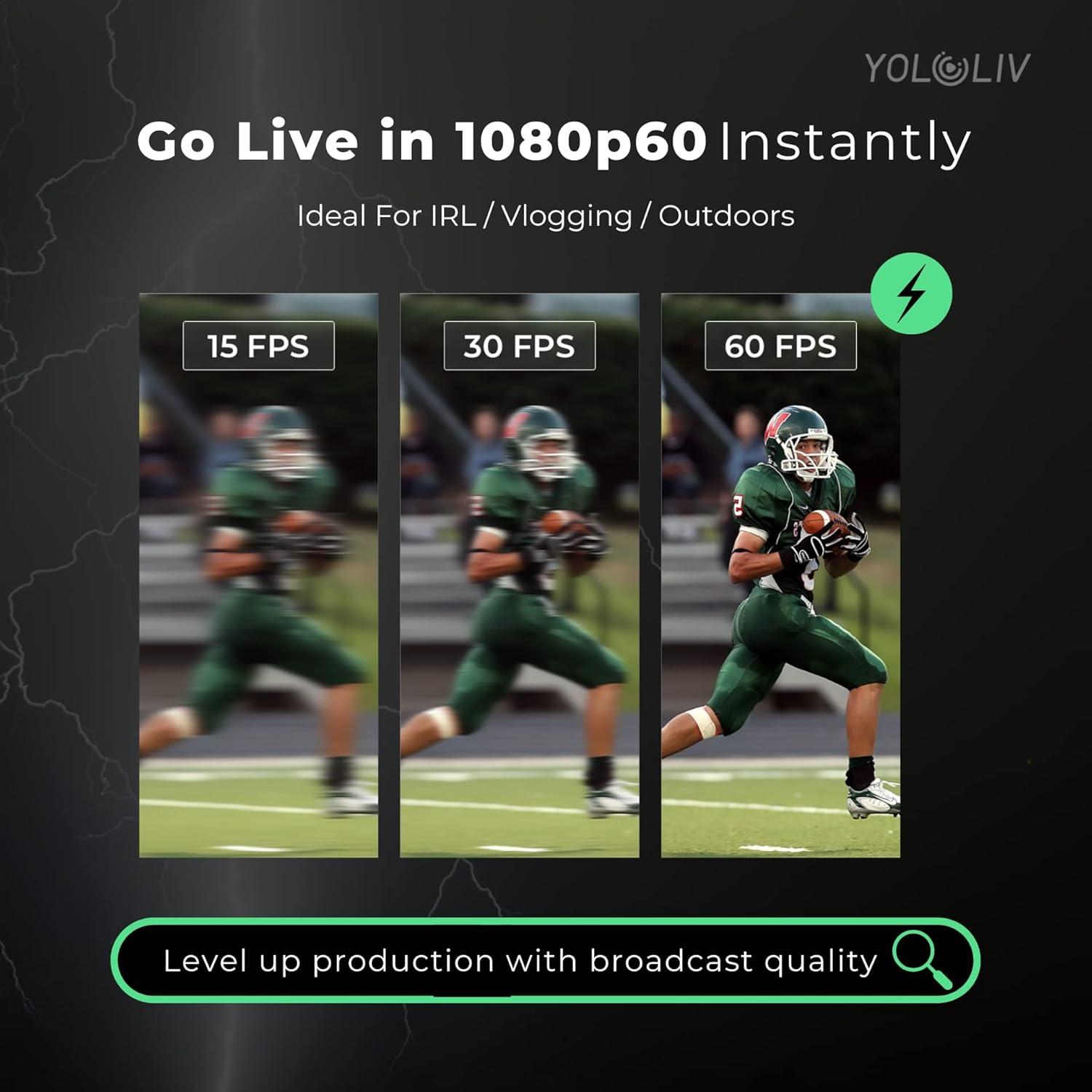
We took the yolobox Mini on a few sorties – a quick sermon stream,a park interview,and a rooftop social – and these are the things that stuck with us. Below you’ll find a compact breakdown of what we loved and what made us pack a backup plan.
Pros
- Genuinely portable: Palm-sized and battery-powered, the Mini lets us go live from places a traditional rig can’t.
- Simultaneous multi-platform streaming: Streaming to Facebook, YouTube, Twitch and custom RTMP/SRT at once meant we reached different audiences without extra encoding boxes.
- all-in-one convenience: Encoder, monitor, switcher and recorder in one box – we traveled lighter and set up faster.
- Intuitive touchscreen: The 5.5″ display made on-the-fly switching, adding overlays and checking audio quick and tactile for the whole team.
- Flexible connectivity: Built-in 4G LTE, WiFi and Ethernet gave us reliable options in unpredictable locations.
- Built-in production features: Overlays, cropping and instant replay let us polish streams without extra software or hardware.
Cons
- Screen feels small for complex shows: The 5.5″ touchscreen is great for quick control but can feel cramped when monitoring multiple inputs or detailed graphics.
- Battery runtime is limited: Up to ~3 hours of streaming is generous for short events, but we needed power banks or mains for longer broadcasts.
- Not a full-featured studio replacement: It replaces a lot of gear, but larger productions may miss extensive I/O, advanced audio routing, and physical faders/knobs.
- Advanced features take time: Beginner-friendly yet setting up custom RTMP/SRT destinations or polishing complex overlays required patience and a bit of manual.
| When we reach for it | When we bring alternatives |
|---|---|
| Quick field streams – interviews, worship services, pop-up events | Long-form broadcasts or multi-operator productions |
| Solo creators needing one compact device | Shows requiring many inputs, advanced routing, or physical control surfaces |
| When we want to stream to multiple platforms fast | When we can’t rely on battery life and need continuous power |
The YoloBox Mini is our favorite “pocket studio” for fast, polished streams on the move.It isn’t a replacement for a full broadcast truck, but when we want to be nimble and professional without hauling a lot of gear, it’s the device we reach for first.
Q&A
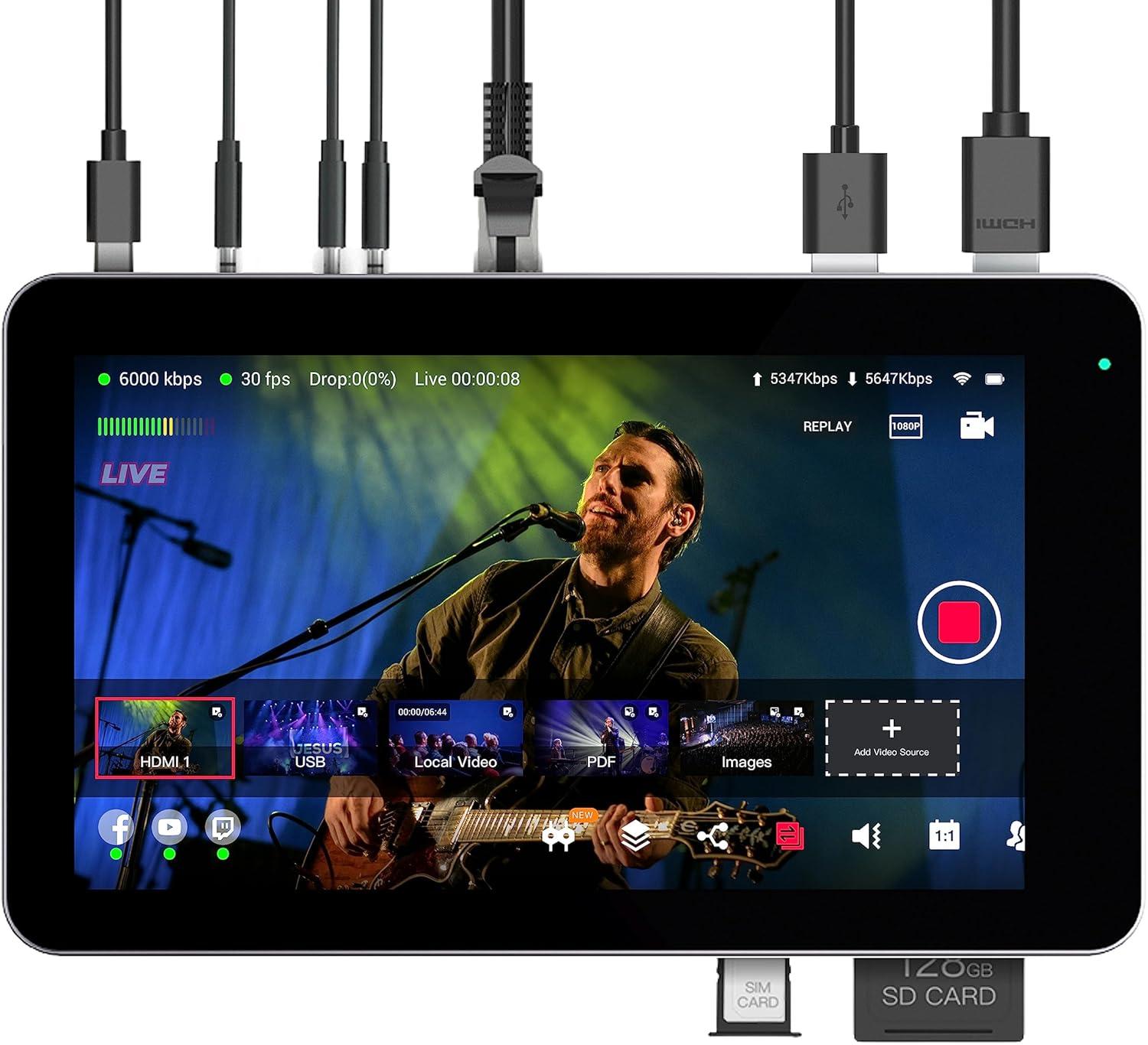
Q: What is the YoloBox Mini in plain terms?
A: It’s a tiny, all-in-one live-streaming studio – encoder, monitor, switcher and recorder rolled into a single pocketable device. We used it as our ”pocket studio” when we needed to go live without hauling a computer or a full rig.
Q: Can it stream to multiple platforms at once?
A: Yes. The Mini lets you push your stream to Facebook, YouTube, Twitch or custom RTMP/SRT destinations simultaneously. In practice we split a test stream to YouTube and Facebook at the same time with zero fuss.
Q: How easy is it to set up and use?
A: very approachable.The 5.5″ touchscreen makes switching sources, adding overlays and monitoring audio intuitive. We got agreeable with the interface in minutes – it’s designed for creators who don’t want to climb a steep learning curve.
Q: How many cameras can we realistically use for a live show?
A: The mini is built for mobile and small-team workflows. In our field tests we easily switched between a dedicated HDMI camera and a phone source (via RTMP/hotspot). For larger multi-HDMI productions you’ll likely need a different model or an external HDMI switcher, but for two- or three-source mobile setups it worked smoothly.Q: Can we stream without Wi‑Fi?
A: Yes. The Mini supports 4G LTE, Wi‑Fi and Ethernet. We streamed from a park using a cellular connection and from a café using Wi‑Fi.The cellular option is a real game-changer when Wi‑Fi is flaky or unavailable.
Q: What about battery life on the go?
A: The manufacturer lists up to three hours; in our mixed-use tests (streaming, overlays, occasional recording) we typically saw close to that but recommend carrying a power bank or spare battery for longer events.
Q: Does it record while streaming?
A: Yes – recording is built in. We recorded locally while streaming without issues,which made producing highlight clips afterward much faster.Q: How good is the video and audio quality?
A: For a pocket device, image quality is solid and consistent. We streamed crisp 720/1080-style feeds and audio stayed clean when using external mics. For broadcast-level multi-camera setups you’ll want more inputs and dedicated audio mixers,but for mobile events,solo creators,and churches the quality was more than acceptable.
Q: Can we add graphics and instant replays?
A: Yes. The device includes overlays, graphics and instant replay features. We enjoyed being able to drop lower thirds and logos live – it noticeably lifted the production value without added complexity.
Q: How reliable is the connection and stream stability?
A: Overall reliable. When we used a strong Wi‑Fi or a stable 4G connection, streams were solid. Expect the usual cellular caveats (signal dropouts in congested areas) and plan accordingly – dual connections or a backup hotspot help.
Q: Is it beginner friendly?
A: Absolutely.The UI is geared toward creators who want pro features without technical headaches. We were able to teach someone unfamiliar with live switching to operate basic functions within a short demo.
Q: What are the Mini’s main limitations?
A: Its compact form is both its strength and its constraint. The touchscreen is small for complex productions, input options are optimized for mobile rather than large studio setups, and battery life, while good, isn’t indefinite. If you need many native HDMI inputs, advanced multi-track audio routing, or very long unattended streams, a larger system would be a better fit.Q: Who should consider buying the YoloBox Mini?
A: Solo creators, vloggers, mobile journalists, small houses of worship, and event freelancers who need a light, portable solution to stream professionally without a laptop. It’s ideal when mobility, simplicity and multi-platform reach matter most.
Q: Any tips from our field tests?
A: Bring a backup power source, test your cellular coverage beforehand, prepare overlays and graphics ahead of time, and run a quick dress rehearsal to confirm audio levels. those small prep steps made our live streams feel calm and polished.
Q: Final verdict in one line?
A: For on-the-go live production where portability and ease matter, the YoloBox Mini is a versatile little studio – practical, approachable, and seriously useful for the kinds of mobile projects we take on.
Embody Excellence
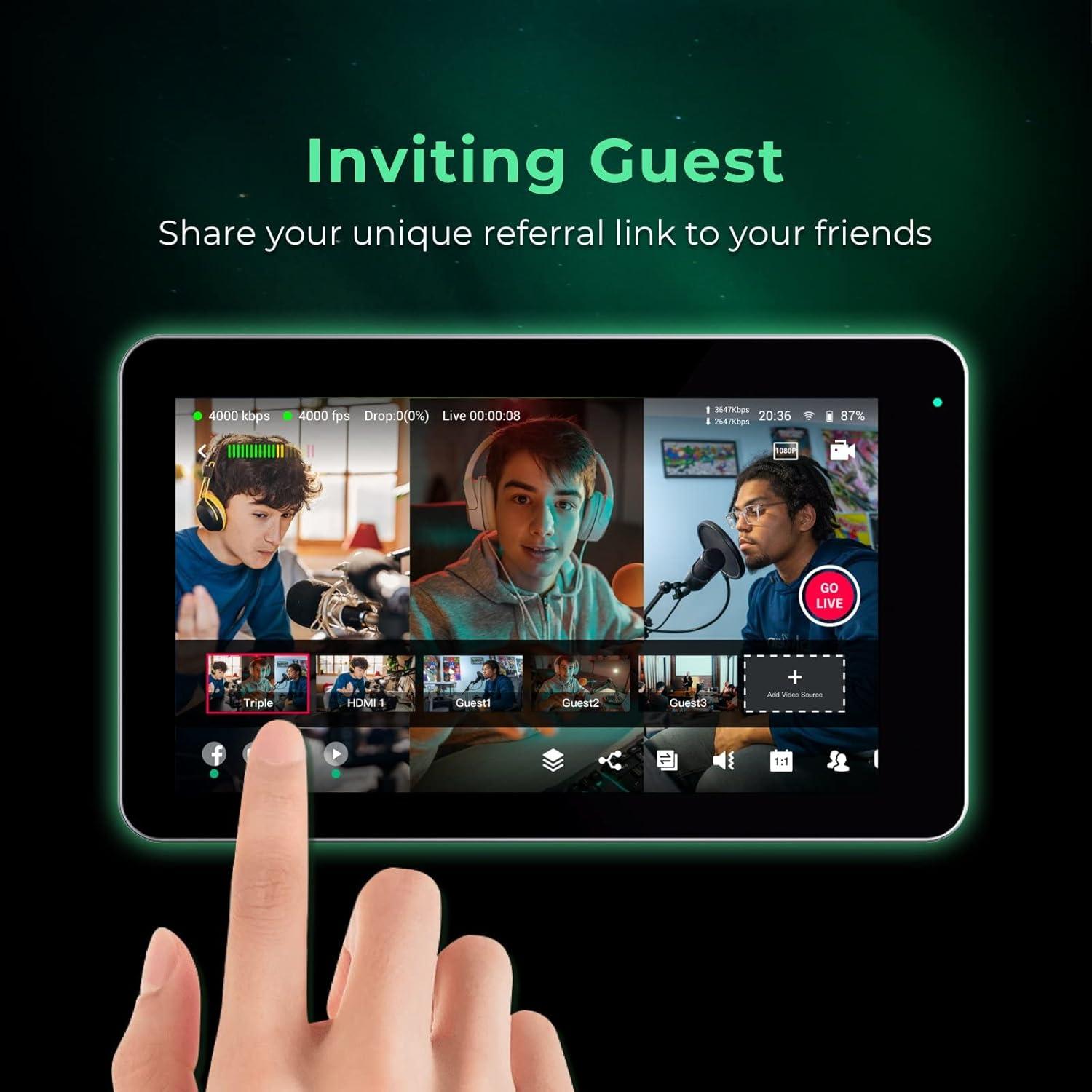
We packed the YoloBox Mini into backpacks, pockets, and the glove box – and every time it delivered the same useful surprise: a true pocket studio that lets us go live without hauling a laptop or a messy pile of gear. Its 5.5″ touchscreen and built-in switcher/encoder/recorder made on-the-fly graphics and source switching feel straightforward, while the multiple-stream support and flexible connectivity (4G LTE, Wi‑Fi, Ethernet) gave us confidence that our audience could be reached no matter where we set up.Battery life and the small footprint do impose practical limits for marathon shoots, but for short events, solo productions, and tight mobile setups it’s a powerful, convenient solution.If you want a compact, all-in-one device that turns any location into a capable streaming rig, the YoloBox Mini is worth a close look. See current pricing, specs, and reviews here: Check the YoloBox Mini on Amazon.
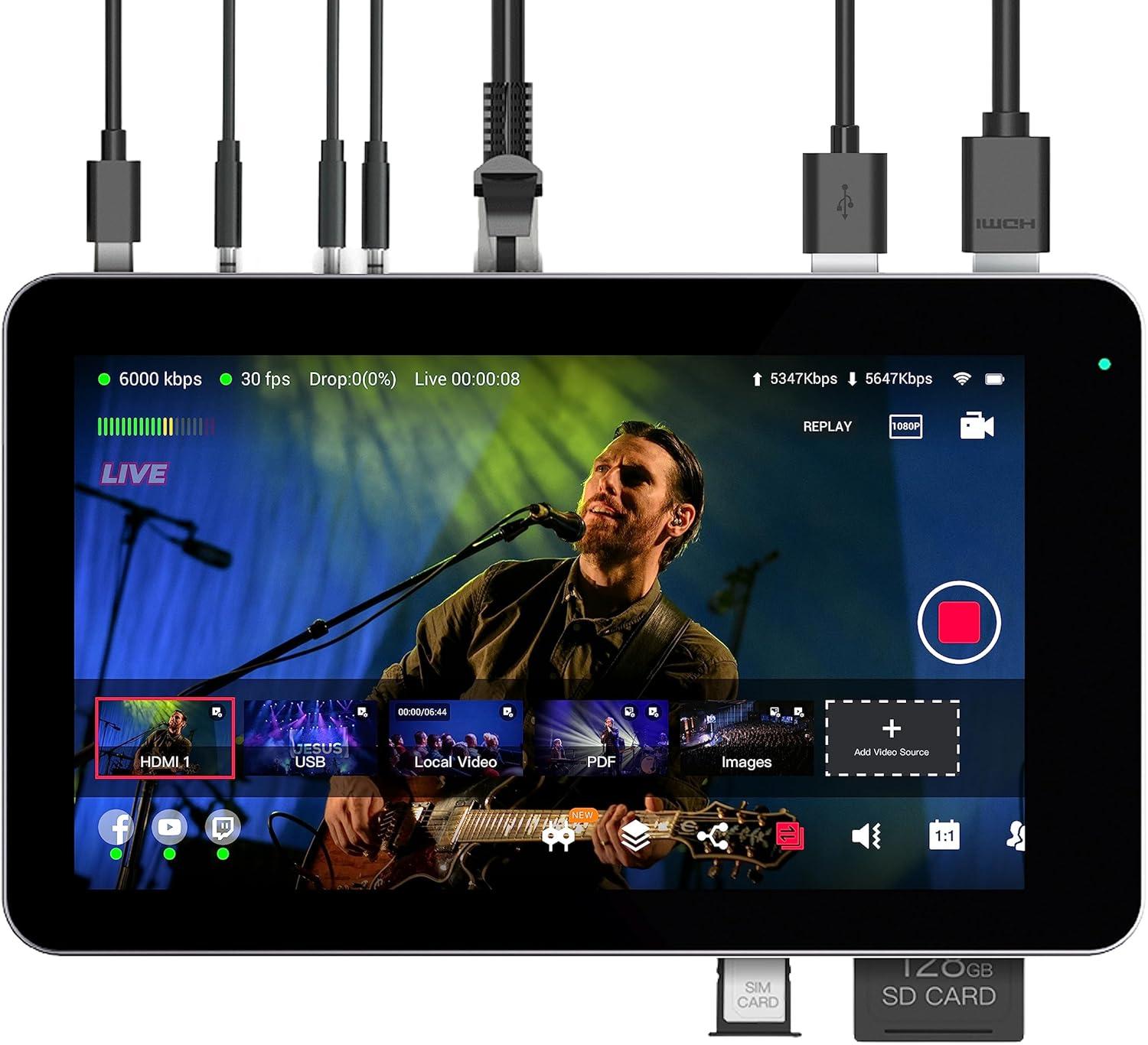
Reviews
There are no reviews yet.